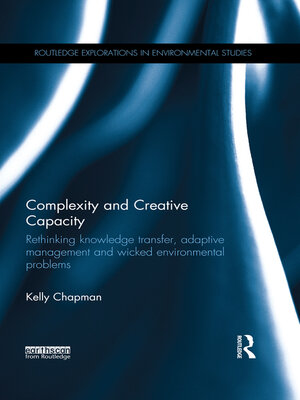Complexity and Creative Capacity
ebook ∣ Rethinking knowledge transfer, adaptive management and wicked environmental problems · Routledge Explorations in Environmental Studies
By Kelly Chapman

Sign up to save your library
With an OverDrive account, you can save your favorite libraries for at-a-glance information about availability. Find out more about OverDrive accounts.
Find this title in Libby, the library reading app by OverDrive.



Search for a digital library with this title
Title found at these libraries:
| Library Name | Distance |
|---|---|
| Loading... |
Complexity theories gained prominence in the 1990s with a focus on self-organising and complex adaptive systems. Since then, complexity theory has become one of the fastest growing topics in both the natural and social sciences, and touted as a revolutionary way of understanding the behaviour of complex systems.
This book uses complexity theory to surface and challenge the deeply held cultural assumptions that shape how we think about reality and knowledge. In doing so it shows how our traditional approaches to generating and applying knowledge may be paradoxically exacerbating some of the 'wicked' environmental problems we are currently facing. The author proposes an innovative and compelling argument for rejecting old constructs of knowledge transfer, adaptive management and adaptive capacity. The book also presents a distinctively coherent and comprehensive synthesis of cognition, learning, knowledge and organizing from a complexity perspective. It concludes with a reconceptualization of the problem of knowledge transfer from a complexity perspective, proposing the concept of creative capacity as an alternative to adaptive capacity as a measure of resilience in socio-ecological systems.
Although written from an environmental management perspective, it is relevant to the broader natural sciences and to a range of other disciplines, including knowledge management, organizational learning, organizational management, and the philosophy of science.







